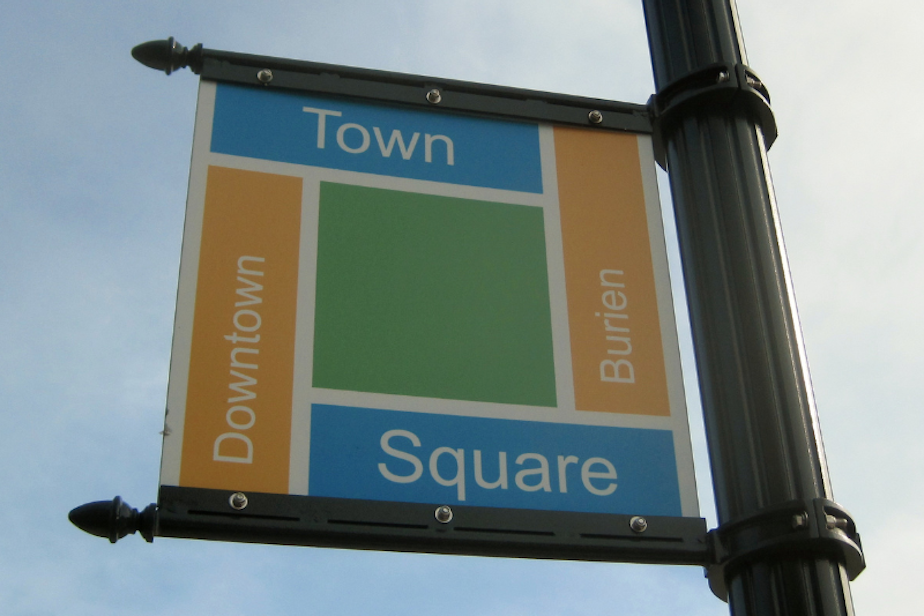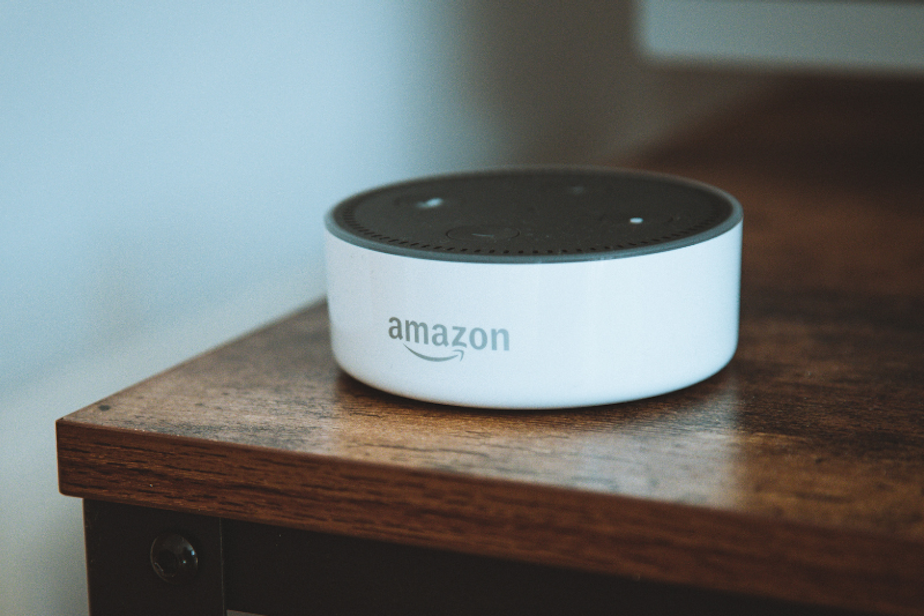Drama at Burien City Hall is about more than one city: Today So Far

- Drama erupted at a Burien City Council meeting this week as tempers flared over a tense issue. But this happens at a lot of council meetings in a lot of cities.
- Stranger things are happening in Seattle's SoDo neighborhood.
- Amazon employees walk out in protest of the company's return-to-office policy.
This post originally appeared in KUOW's Today So Far newsletter for June 1, 2023.
There were hopes that the Burien City Council meeting this week could have been "a productive one and collaborative one," because, "That would be a lovely and welcome change.” That's what Councilmember Cydney Moore said before public comment commenced. By the end of the meeting, someone had yelled, "Why don’t you shut the f%#& up?!” to the passionate council chambers.
For years, I couldn't watch the TV show "Parks and Rec," because while the public meeting segments were pure comedy for the average viewer, as a newspaper reporter, the show was all too real.
Of course, there is a big difference between sitcom city hall and reality city hall. The sitcom is designed for laughs and can be turned off after 30 minutes. In reality, the problems discussed at city hall are very real, and ongoing. And if you're in a town like Burien, such problems can be much bigger than your city, like homelessness. And that can just make passions more inflamed and bitter. If there is one thing that rings true for both sitcom and reality city hall, it's when Parks and Rec Deputy Director Leslie Knope states, "These people are members of the community that care about where they live, so what I hear when I'm being yelled at is people caring loudly at me."
The drama in Burien this week centers on an undeveloped city park, but to residents it's about much more — homelessness, mental health, crime, safety, and other issues woven tightly together, which our region can't seem to get a handle on. Read the full story here. In short, the nonprofit Burien C.A.R.E.S. wants to turn the space into a dog park, and has a lease with the city to do so. There's a problem with that plan — a homeless encampment is currently set up on the property. What to do? Some want to sweep the camp to make way for the lease, which brings up another problem. King County has said it won't help with any such sweep, and also, the sheriff's department (which Burien contracts with for its own police) won't help either.
At Burien City Hall this week, more than 30 people signed up to speak during time for public comment, and many were ready to boo, cheer, name call, curse, laugh, and more. Community members accused the city of leasing the property in the first place so Burien can keep its hands clean while someone else moves the tents away. This tense discussion was echoed on the dais. In the end, no decisions were made. The encampment was eventually swept by the nonprofit and private security. Burien has no shelters or other services for folks to move to.
Sponsored
A lot of the feelings in the council chambers that night didn't translate well over video of the meeting, and a lot of the crowd commentary wasn't captured on mic. A few folks described the "rage" in the room. Exchanges were heated, and tempers were running high. KUOW's Casey Martin was in the room that night. His full story can be read here.
It's important to note something here. Some folks commenting that night said they were embarrassed by how Burien looks amid this controversy, and rageful interactions at a city meeting. That's understandable, but here's the thing: Burien is not unique. This sort of passionate, bickering city meeting is very common. It can sometimes feel as if TV and reality are blending. You have the usual cast of characters at these meetings in every city. You'll get a Dwight Schrute who has a straightforward, yet unreasonable plan. Frasier Crane will deliver a verbose diatribe, blaming the council for every problem, current and past. Steve Urkel will show up with information nobody really understands. Jerry Seinfeld will grab the mic and only offer questions, asking, "What is the deal with this city?" Eventually, Archie Bunker will speak, and that will just send the meeting off the rails.
Back to reality. I've seen official meetings on seemingly boring issues transform into rants about going vegan, how the Fibonacci sequence can be used to predict the next financial crisis, or global warming conspiracy theories. And if you see a guitar show up at a public meeting, get ready to witness the next viral video happening live, before your eyes. I guarantee you, all of this happens at city meetings far and wide, including your own. It's not just about Burien. It's not about any city, really. It's more about us, and how we work through problems.
Blame it on social media, blame it on a sense of having no control, blame it on a lack of mindfulness, blame it on the rain. Whatever the cause, a lot of us have developed a bad habit of demonizing and yelling. As a result, city halls can get used as a form of catharsis. But this way of doing things is a lot like a rocking chair — getting angry at your neighbors may give you something to do, but it won't take you anywhere. The problems persist in the meantime. There are still folks experiencing homelessness in Burien, and there is a lack of answers. Actually going somewhere takes hard work, harder than stuffing all your comments into a single minute at a council meeting. It takes working together.
“I’m pretty disappointed because I feel like it’s a whole lot of nothing burger,” Councilmember Moore said after meeting was over. “At this time, the city is not choosing to take any particular action in terms of where people can go, what the next steps are, how we can keep people safe, or housed, or sheltered.”
Sponsored
KUOW's "Seattle Now" also dives into this issue today.
Stranger things are happening in Seattle. I recently got an up-close view of "Stranger Things: The Experience" that recently debuted in SoDo. My review, in short: It's bitchin'.
From comicons to the recent "Friends" feature that made a stop in Seattle, I've toured quite a few pop culture attractions. They're generally fun, nostalgic, and full of photo ops. "Stranger Things: The Experience" did surprise me in one way — it's very interactive. Half of the feature is essentially larping. Actors and even the show's characters create a story on a set pulled directly from the show. You're essentially taking part in an episode. There is even 3D. If you've ever been on those tourist "rides" at Universal Studios, that is the only thing I can liken it to. In the end, it's a nostalgic '80s event with plenty of "Stranger Things" fandom to engage with. You can even have a slice of Surfer Boy Pizza.
My full review can be found here.
Sponsored
An estimated 900 Amazon employees walked out of the company's Seattle HQ this week to protest the its return-to-office policy. Amazon estimates that it was more like 300. Overall, employee activists say that about 2,000 coworkers walked out of Amazon offices globally.
"We want to see Amazon commit to being a progressive employer that supports all employees, working parents, colleagues with disabilities, and colleagues of color who prefer to do their best work remotely," said Emily Cunningham at the lunch hour walkout.
Cunningham is a former Amazon employee who claims she was fired for speaking up about Amazon and environmental issues. Amazon refutes that claim. The company also counters the notion that all employees have responded negatively to its return-to-the-office policy, which started in May. A spokesperson said the past few weeks have been great with "good energy on campus and in urban cores like Seattle where we have a large presence. We've heard this from lots of employees and the businesses that surround our offices.”
Read the full story here.
AS SEEN ON KUOW
Sponsored

A warmer climate has lengthened mosquito season in the Seattle-Tacoma area, according to the nonprofit Climate Central. A report from the nonprofit states mosquito season is now 32 days longer in Seattle than it was 40 years ago. (Climate Central)
DID YOU KNOW? Seattle's rough pinball history
In honor of the Northwest Pinball and Arcade Show coming up this weekend in Tacoma (and because I'm stoked about it), here's a little pinball history.
The history of pinball in Seattle is a long, tense tale. As such, today’s Did You Know segment is a bit longer. As I wrote yesterday, pinball’s origins were in games of chance that were popular among locales associated with vice. That meant politicians wanted to regulate them, ban them, malign them, and so forth. It also meant that organizations that peddled in vice (companies, organized crime, and even unions) often shook things up — literally shook things up. There were fights and bombings over these machines.
Sponsored
In the early 1940s, New York Mayor Fiorello LaGuardia famously sent police to raid small businesses and take their machines. He then smashed many machines with a sledgehammer, sending the message that they were banned. The Illinois Supreme Court ruled that the machines were gambling devices, so Chicago banned them too. Other major cities followed. WWII happened around this time, and the metals used in the machines were needed for the war effort, so a patriotic sentiment also arose against pinball machines.
Seattle took a different approach. Instead of prohibition, governments have another option when it comes to controversial issues — tax the hell out of them. Seattle set up a tax and fee system for pinball and other machines like juke boxes in the 1940s. It was known as the “tolerance policy.” This replaced Seattle’s previous system — bar owners bribing police officers. During this time, pinball was evolving away from games of chance and into the skilled games we know today. But that nuance was lost on most people.
In the 1950s, two pinball suppliers waged war against each other. The Amusement Association of Seattle (AAS) teamed up with a local union who heavily suggested (aka forced) bars to carry AAS machines. At the same time, Colacurcio Brothers Amusement Incorporated was also intimidating bar owners to take their machines. In October 1957, someone bombed Century Distributing, a pinball business partnered with AAS. Another bomb went off in January 1959 at Pioneer Card Company. Then a bomb destroyed a car owned by AAS treasurer Fred Galeno in 1960. That same year, mayoral candidate Gordon Newell’s car was bombed; he blamed the incident on his statements around pinball. Also in 1960, Michael Distributing Company, a business associated with AAS, was bombed. During all this, Seattle Mayor Gordon Clinton pushed for a ban on pinball. The council never let any happen, however. After all, there was so much money from those pinball taxes and fees coming in.
Believe it or not, that’s the “brief” history. The full story involves corruption, arrests, under-the-table political payoffs, and (possibly) murder. For further reading, I highly recommend this account on History Link, and this splendid write up at The Seattle Times.
ALSO ON OUR MINDS

Amazon must pay over $30 million over claims it invaded privacy with Ring and Alexa
Amazon will pay more than $30 million in fines to settle alleged privacy violations involving its voice assistant Alexa and doorbell camera Ring, according to federal filings.

